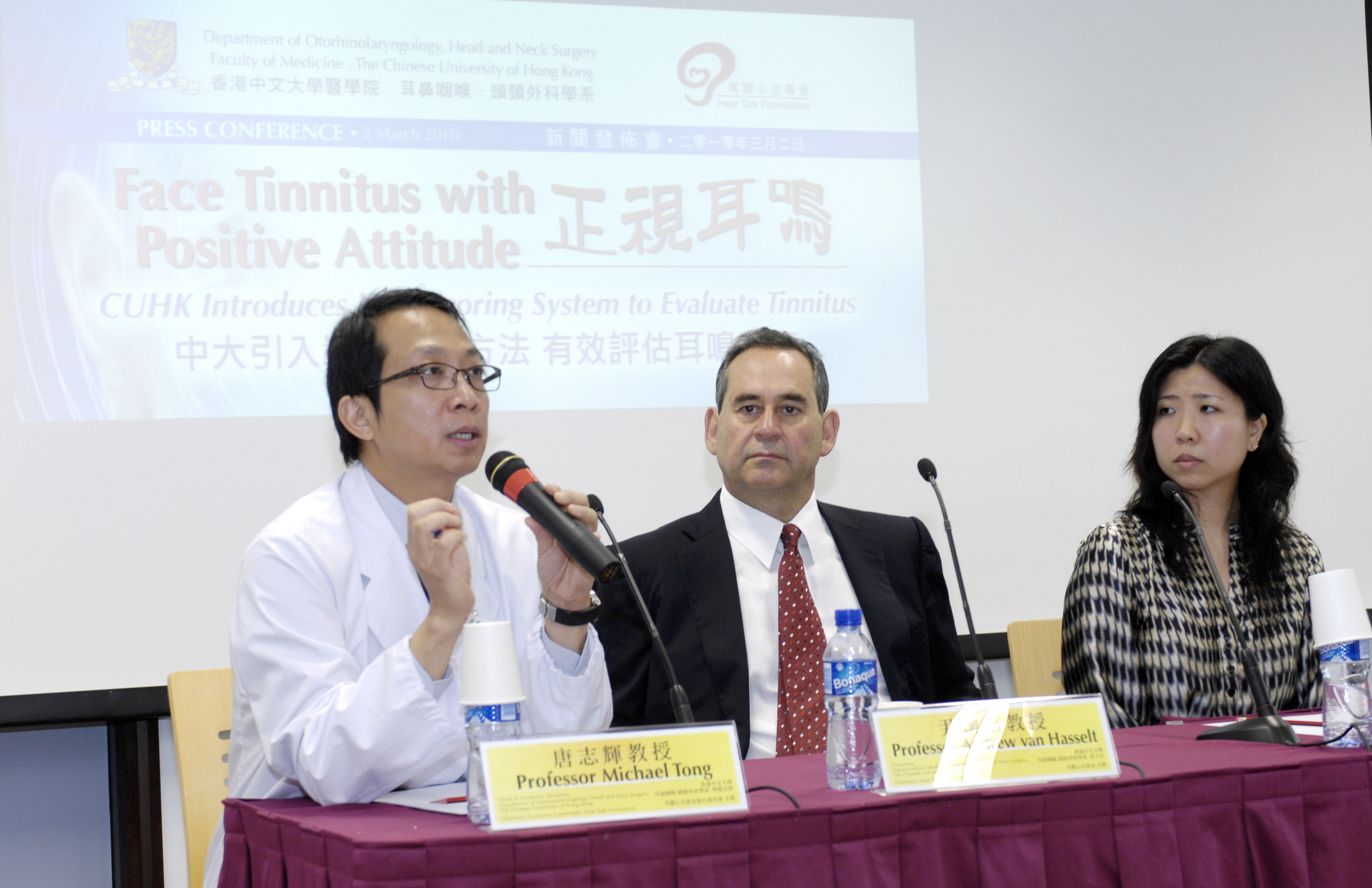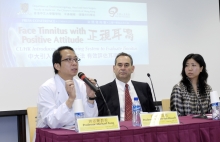CUHK
News Centre
Face Tinnitus with Positive AttitudeCUHK Introduces New Scoring System to Evaluate Tinnitus
Tinnitus has been defined as a conscious experience of sound that originates in the head without an external acoustic source. Tinnitus prevalence ranging from 10% to 30% has been reported in different studies in the world. In the United States, over 20% of people experience tinnitus severe enough to seek medical consultation. Therefore, it is estimated that over 200,000 people in Hong Kong are suffering from moderate to severe tinnitus.
Age-related hearing loss and noise exposure have been reported as common risk factors for tinnitus. Assessment of tinnitus is a challenging task and self-assessments predominate because of the subjective nature of the condition. Investigating the psychological impact that tinnitus has on a patient is crucial to its management. The Department of Otorhinolaryngology, Head and Neck Surgery at The Chinese University of Hong Kong (CUHK) has successfully adapted the Chinese (Cantonese) version of the Tinnitus Questionnaire (TQ-CH), which was originally developed in the United Kingdom, to quantify the impact of tinnitus on daily living in the Hong Kong population.
One hundred and fourteen adults, aged from 18 to 87, with hearing ability that varied from normal to profound deafness participated in the survey from April to October 2008. The subjects were patients who reported experiencing tinnitus during their audiological evaluation at the audiology clinics of the Prince of Wales Hospital, Pamela Youde Nethersole Eastern Hospital and Yan Chai Hospital. The subjects included patients whose primary complaint was tinnitus as well as those whose tinnitus was secondary to their hearing loss.
The mean total score for the TQ-CH was 34.02 (SD = 21.54). Scores obtained were not significantly different in the female and male subjects. Complaints from the subjects could be categorized into 5 domains. These were auditory perceptual difficulties, cognitive and emotional distress, somatic complaints, sleep disturbance, and intrusiveness. Subjects with tinnitus as a primary complaint scored significantly higher on the TQ-CH than the group with tinnitus as a secondary complaint, providing evidence that the TQ-CH is a valid tinnitus-related distress measure.
Patients who have mild tinnitus may be reassured and gain relief by informative counseling on the auditory system and the mechanism by which tinnitus is generated. Hearing aids are useful for those with tinnitus in association with a hearing impairment. Sound therapy and cognitive behavioral therapy are also options for management.
CUHK and the Hear Talk Foundation advise the public to avoid exposure to loud noise. People who experience tinnitus should consult an ear, nose and throat specialist to rule out the possibility of more serious underlying conditions, such as Meniere’s disease and acoustic neuroma, which would require further investigation and medical intervention.
'Tinnitus is a common hearing problem,’ said Prof. Michael Tong, Head of Academic Divisions of the Department of Otorhinolaryngology, Head and Neck Surgery, CUHK and Chairman of the Executive Committee of Hear Talk Foundation. ‘Seeking professional assistance and learning more about the condition can assist towards adopting a positive attitude which will certainly contribute to dealing with the condition.’
Initiated by China Disabled Persons’ Federation, the Ministry of Education, the Ministry of Civil Affairs, the Ministry of Health, ‘March 3 National Ear Care Day’ has been launched in China since 2000. The campaign has been one of the highlights of Hear Talk Foundation since its inception in 2004 in Hong Kong. Hearing impairment is regarded as a ‘silent disability’ because of the nature of the disease and also, this disability is not apparent to the casual observer. Therefore, the needs of people suffering from hearing disorders are often neglected. In line with March 3 National Ear Care Day, the Hear Talk Foundation encourages the public, from all walks of life, to protect their precious hearing on a daily basis.
Please visit www.heartalk.org for more information on tinnitus, or call 2632-1410 for enquiries.



